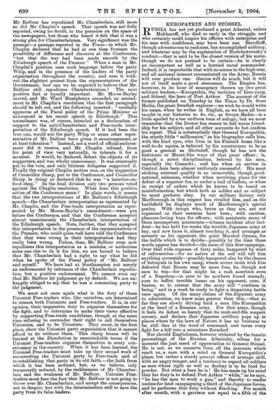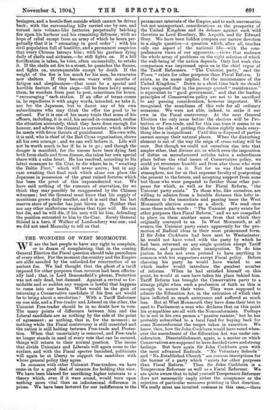R USSIA has not yet produced a great Admiral, unless Makharoff,
who died so early in the struggle, and who certainly could inspire his officers with enterprise and his men with confidence, may have been one. Skrydloff, though adventurous to rashness, has accomplished nothing; and whatever may be the explanation of Rozhdestvensky's conduct—that is said to be the closest version of his name, though we do not pretend to be certain—he is clearly an incompetent as well as a hurried naval commander. Indeed, it is improbable that with no access to the high seas, nnd all national interest concentrated on the Army, Russia Will ever produce one. Genius 'will do much, but it will not of itself make a good steersman. The Empire has, however, in its hour of emergency thrown up two great 'military leaders,—Kuropatkin, the tactician of Liao-yang, and Stossel, the hero of Port Arthur. The account of the former published on Tuesday in the Times by Dr. Sven Hedin, the great Swedish explorer—we wish he would write his name, when he writes in English, as we have all been taught in our histories to do, viz., as Sweyn Hedin—is a little spoiled by a too uniform tone of eulogy; but we must remember that the Doctor has reason to feel warm friend- ship for his subject, and all other accounts do but confirm his report. This is substantially that General Kuropatkin, the sturdy little "millionaire," as his biographer calls him, with the kind eyes, who lives in his Finland home like a well-to-do squire, is believed by his countrymen to be as good a- general as Skobeleff, though he has not the histrionic or Murat-like ways of that great officer ; is, though a strict disciplinarian, beloved by his men, especially the Cossacks ; and has when on service in. Central Asia been almost uniformly successful. His most striking external quality is an immovable, though good- natured, calmness, whether when revolving plans for the defeat of a superior foe, or under a hail of bullets, or when in receipt of orders which he knows to be based on misinformation, but which both as soldier and as subject he must perforce obey. In our military history only Marlborough in this respect has rivalled him, and on the battlefield he displays much of Marlborough's special genius. With troops who, brave as they are, are not organised as their enemies have been ; with careless, pleasure-loving boys for officers ; with assistants many of them incompetent aristocrats—witness incident after inci- dent—he has held for weeks the terrible Japanese army at bay, and now faces it, almost touching it, and arranges as serenely as his opponent, the quiet Marshal Oyama, for the battle which is to decide—possibly by the time these words appear has decided—the issue of this first campaign. Over that wide expanse of forty miles, hampered by want of information—for no native of the soil will tell him anything accurately—possibly hampered also by the chance of betrayals in his own camp, where scores must wish him defeated that Russia may be more free, he, though not sure to win—for that might be a rash assertion even of a Napoleon—is sure to be nowhere found unready, sure to inflict terrible losses on his opponent, sure, if beaten, so to retreat that the army will "continue in being," and in a week be ready to fight a despairing battle once again. Of the many claims of the Japanese army to admiration, we know none greater than this,—that so far they are slowly driving back a man like Kuropatkin at the head of a Russian army. For that army, though it feels its defeat so keenly that its rank-and-file suspect sorcery, and declare that Japanese artillery pops up in places where by the laws of Nature it has no business to be, still dies at the word of command, and turns every fight for a hill into a miniature Zorndorf. Nor should Englishmen, however irritated by the lunatic proceedings of the Russian Admiralty, refuse for a moment the just meed of appreciation to General Stiissel. He is not, as we conceive from all the accounts which reach us, a man with a mind on General Kuropatkin's plane, but rather a sturdy general officer of average skill, with an angry temper, and a tendency to regard all soldiers as men whose right as well as destiny is to be food for powder. But what a hero he is ! He has made up his mind that his duty is to defend Port Arthur "while," as he says, " he has the men to work a gun," and thereby to render useless for land campaigning a third of the Japanese forces, and he performs that duty without flinching. For month after month, with a garrison not equal to a fifth of the besiegers, and a hostile fleet outside which cannot be driven back; with the surrounding hills carried one by one, and turned into volcano-like batteries perpetually belching fire upon his harbour and his remaining defences; with no hope of relief except from an army of which he hears per- petually that it is "retreating in good order " ; with his civil population full of hostility, and a permanent suspicion that every Chinese betrays him ; with his garrison dying daily of shells and sickness,—he still fights on. If a hill fortification is taken, he tries, often successfully, to retake it. If the shells set fire to a street, he quenches the flames, and fights on, unconquerable except by death. If the weight of the fire is too much for his men, he excavates new shelters. If they become weary with months of fatigue and, sleeplessness—that must be a special and horrible feature of this siege—till he fears laxity among them, he wanders from post to post, sometimes for hours, " encouraging " each station. If an offer of terms comes in, he repudiates it with angry words, intended, we take it, not for the Japanese, but to daunt any of his own subordinates who may think the offer too good to be refused. For it is one of his many trials that some of his officers, including, it is said, his second-in-command, realise the situation accurately, think they have done enough for honour, and advise the General to surrender, which advice he meets with fierce threats of punishment. His own wife, it is said, who is chief of the Red Cross organisation, shows all his own courage ; and we can well believe it. Life will not be worth much to her if he is to go ; and though the danger is manifold, for the nurses have been dying fast both from shells and from disease, she takes her own special share with a calm heart. He has resolved, according to his latest messages to the Czar, to die where he is, "awaiting -the Baltic Fleet," which will never arrive ; but in any case awaiting that final rush which alone can place the Japanese in possession of the great ruined fortress which has been the pivot of this unprecedented war. We have said nothing of the rumours of starvation, for we think they marpossibly be exaggerated by the Chinese witnesses; but the General must know that his supply of munitions grows daily smaller, and it is said that his last reserve store of powder has just blown up. Neither that nor any other misfortune weakens that tiger will. He can but die, and he will die, if his men will let him, defending the position entrusted to him by the Czar. Surely General Stossel is a hero, if Walker of Londonderry was one ; and we did not need Macaulay to tell us that.
• THE WONDERS OF WEST MONMOUTH.



























































 Previous page
Previous page